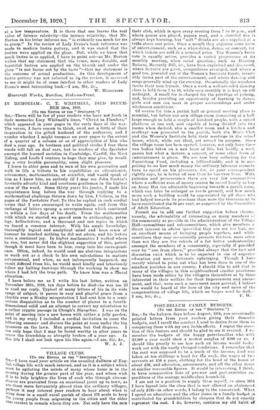IN MEMORIAM C. T. WIIITMELL, DIED DECEM- BEE lOrri, 1919.
[To THE EDITOR or THE " SEEM/10E2]
Sni„—There will be few of your readers who have not fresh in their memories Lucy Whitmell'e lines. "Christ in Flanders," which appeared in your pages in the early days of the war. The verses, I have reason to think, owed not a little of their inspiration to the gifted husband of the authoress, and I wonder whether I might trespass on your pages to the extent of a quarter of a column or so of appreciation of him who died a year ago. In business and political cirdes I fear these words will fall on deaf ears, but to readers of the Spectator amongst the learned societies in Cambridge, Cardiff, the West Riding, and Leeds I venture to hope they may give, by recall- ing a very lovable personality, some slight pleasure.
I leave to abler pens and to men of his own generation and walk in lifo a tribute to his capabilities as educationist, astronomer, mathematician, or scientist, and would speak of him as I knew him, an entirely (if I may use John Ruskin's favourite adverb) kind and courteous gentleman in the highest sense of the word. Some thirty years his junior, I made his acquaintance long before the war through replying to a mathematical challenge thrown down by him, I believe, in the pages of the Yorkshire Post. To this he replied in such cordial terms that I was encouraged to write again, and from this exchange of letters sprang a correspondence which continued to within a few days of his death. From the mathematics with which we started we passed soon to archaeology, petro- logy, belles-lettres, and a thousand and one topics in which we found a common interest. With his ample knowledge, thoroughly logical and analytical mind and keen sense of humour he touched nothing he did not adorn, and his letters were a continual joy. In higher mathematics I walked where lie ran, but never did the slightest suggestion of this, patent though it must have been to him, creep into his correspond- ence. Often, indeed, he would send me abstruse integrations to work out as a check to his own calculations in matters astronomical, and when, as not infrequently happened, my result differed from his, he would most kindly and laboriously follow my halting footsteps through the working to show me where I had left the true path. To know him was a liberal education.
I have before mo as I write his last letter, written on November 30th, 1919, ten days before he died—he was too ill to read my reply. Typical of many letters of his in its wide range of subject, it passes in easy and playful grace from a chuckle over a Henley misquotation I had sent him to a semi- serious disquisition as to the number of planes in a fourth- dimensional solid and an attempt to correct my orientation to a rather cryptic passage in Clough's Dipsychus. I was on the point of moving into a new house with rather a jolly garden, and in my reply I included a cordial invitation to come the following summer and discuss the point at issue under the big sycamore on the lawn. Man proposes, but God disposes. I ran only hope that I may be found worthy in after years to renew the friendship so abruptly broken off a year ago. In this life I shall not look upon his like again.—I am, Sir, sic.,
W. A. J.






































 Previous page
Previous page